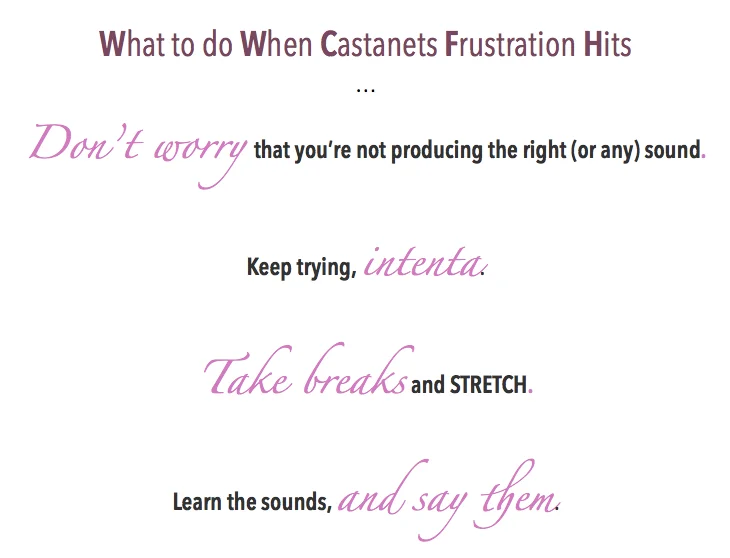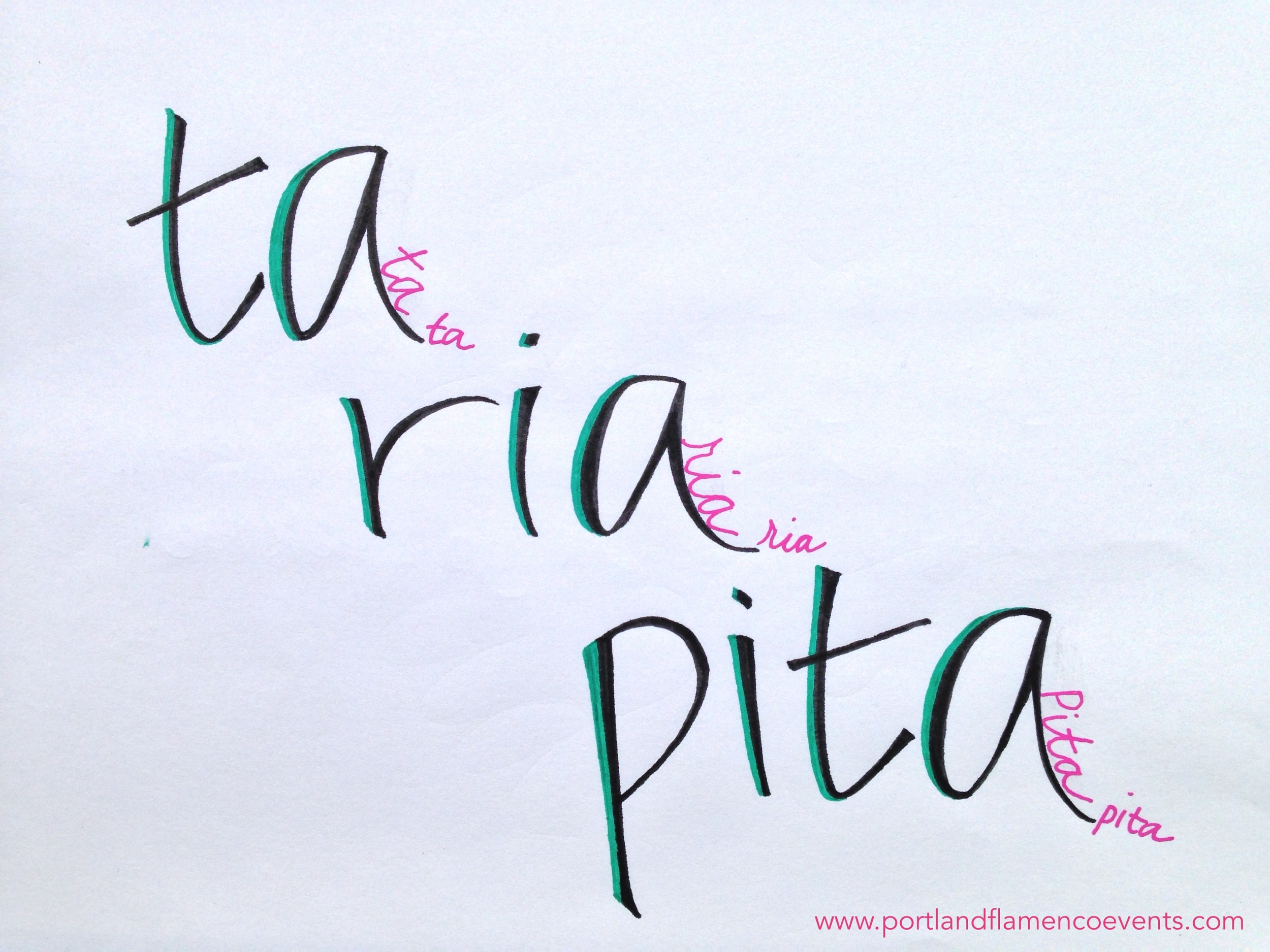If you've ever taken class with Mercedes Ruíz, you will likely recognize the words and phrases below. If you have not yet studied with her and plan to, prepare, because you are sure to hear these utterances over and over again.
If you have previously studied with her but were unsure of what she meant, read on, and find out.
If you have not studied with her and don't plan to, read anyway because the first eight are important tips to remember all of the time in your independent practice or in anybody's class.
Let's Begin
You've read my thoughts on avoiding castanets burn-out, and you've read about what made castanets finally doable for me. Today I'll share with you five important technique tips. But first, a castanets confession.
It has to do with my moving thumb.
My right thumb, that is. My right thumb that moves when I am doing the roll with my four fingers, well, and when doing postiseo, but it's supposed to move then, so that's a good thing.
It's a bad habit that I formed in my alone practicing.
I don't know if I could have avoided it had I spent more time studying under someone else's guidance in the beginning. I don't know if the teacher would have noticed it happening and helped me to prevent it from continuing and developing into a habit. These are things I wonder about.
Most people tell me it's almost impossible to "fix" at this point.
Most people except for Emilio.
Yesterday I told you we’d talk about what to do when castanets frustration hits. Because it will.
Below are some ideas:
1. Don’t worry that you’re not producing the right (or any) sound.
This is part of the castanets learning process.
The movements are AWKWARD. Please give your sweet fingers some time to assimilate new movements they’re not used to making.
Sometimes remembering you’re not alone helps a lot. (You're not alone!)
2. Keep trying.
When I would tell Mercedes I can’t do it, she would always say the same thing,
As you know I stayed away from castanets for quite some time. I had my reasons.
Which I’ll share with you today along with the best thing you can do for yourself when starting out.
Let’s begin with my reasons for having avoided castanets for so long
Reason #1: Rebellion.
In part I was rebelling, at least that’s what I told myself.
Rebelling because when I would mention that I danced flamenco it seemed just about every other person would assume I played castanets,
"Ohhhhhh, so you play those things,” making motions with their fingers, “that make the clacking sounds?”
“No, I do not play those things, and actually you don’t need to play those things to do flamenco,” I’d say.
It’s true, one does not have to play castanets to do flamenco, but there was certainly a little bit of defensive me who-didn’t-know-how-to-play-so-don't-ask-me-that talking.
And then there was Reason #2,
Ricardo is here, and I’m already disappointing him. He arrived on Tuesday, and it didn’t take long.
I’ll tell you about the desilusión and share three dance tips (Ricardo López) from his class last night. Three tips that are important to keep in mind at all times.
First, the disappointment
There’s really a lot of me feeling disappointed with myself going on.
Why didn’t I study before he came?
Why didn’t I make it a point to remember things he’d taught me in the past?
Why don’t I just pick things up quickly and do them well right away?
Why haven’t I been working on my technique more?
It started on Tuesday when he arrived.
Learning to play castanets can be frustrating, especially in the beginning.
But that doesn’t mean you shouldn’t do it.
In the coming days I’ll be sharing some tips on how to deal with some potential frustrations that come with learning this (completely and totally worth it to learn) technique.
For today, let's look at the toque for thefourth copla por sevillanas.
As usual, you'll find it written in two different ways. Use whichever makes the most sense to you. And remember, there are different variations of the toques, and this is one of many!
Me and the bata de cola.
You could say that there’s really no excuse for me not being able to dance well with the bata.
Because I’ve had several experiences, various opportunities to learn.
I'll tell you about a one of my favorites today, and after the story, I'll tell you why you should study the bata even if you don't ever want to dance with it, and I'll share with you another bata need-to-know.
A [very] brief history of my bata experiences
You know about the first,
People are often asking me about my how I got started dancing flamenco, so I’m going to tell you a story from that time today. At the end of the story you’ll find a tip on dancing with the bata de cola, it's an essential, and you can work on it anywhere, in the bathroom, in the bedroom ...
But first, Spain
Yesterday in Part 1, I told you what I do when class feels to hard, how I make it more do-able, more enjoyable.
My lazy pants
When class feels too easy it usually means I could be doing a lot more to challenge myself. In other words, I need not leave it up to the teacher or the moves.
And as I mentioned yesterday, what we get out of class is really up to us, and we can benefit from any class.
Sometimes we get anxious ...
Why is it moving so slowly? Come on, already!
And we wonder if we’ll ever progress at this rate.
To be perfectly honest, my freak outs generally come from feeling that class is too hard, which you likely know by now.
But when I start noticing myself spacing out, bored, or antsy in class, here are some things I do:
Bulerías.
It is the thing that everyone dances, even the guitarists and the singers.
It is the thing that, besides Mercedes, keeps calling me back to Jerez.
It is where we really let our personalities show.
It is SO MUCH FUN.
But there are certain must-knows for doing this dance.
Perhaps the first is that we all need to do it. I'm not joking about that.
You can’t do flamenco and NOT do bulerías, even though I used to think you could.
It is not easy.
We know that.
So let's look at five essentials, five things we need to know in order to dance bulerías:
People are feeling nervous.
Nervous and anxious about the Student Showcase on Saturday.
I know this feeling. Well.
So I thought I'd repost these tips today, performance tips.
Whether you're performing in front of your friends in class,
at a show in front of the public,
or even just in your own bedroom in front of your cat,
There are things we can do to ease our nerves ...
I know that workshops can seem overwhelming at times,
and hard.
Difícil.
Ricardo López, one of my favorite guys ever, knows this too.
And yes, even though he is a professional dancer who travels the world performing with people like Rafaela Carrasco, he still enjoys studying and taking cursillos.
So I want to share with you three suggestions from Ricardo that we can use in class.
And after that I'll talk about how his tips can help us outside of the studio as well.
She said she was going to show them how to dance in a losa
Pequeña.
Y por fiesta.
It was Ani who said that. Ana María López. She said it on a Monday morning in Jerez.
We had been there for a little over a week I guess.
And on this particular Monday morning the ladies had gone to bulerías class ahead of me.
When I walked in I saw something I'd never seen before
On the wall of her studio Mercedes has a photo of herself with Marco Flores when they were young. I wish you could see it. In the interview that follows Marco mentions how they danced together when they were starting out. They still do.
You'll also find out about how Marco grew up with flamenco in his family, how he began his career, and about his process of creation. He even shares some direct tips for us as students, though bits of advice can be found in all of his responses.
I originally posted it in 2011 and repost it today after watching snippets of his latest espectáculo from the 2014 Jerez Festival. Oh how I want to see that show! Further down you'll see a video of him dancing solo por siguiriyas.
1. Do it anyway
2. Come back to your body
3. Respect opinions, but be yourself
4. Feel and allow
5. Notice all of the other "not thems" who are doing it alongside you
6. Remember that art is universal, and so is expression
From Jerez last fall ...
Sunday night I was writing
About flamenco and Jerez and what I'm doing here and what I want to learn here.
And I set some intentions for the week.
I had a few.
One was to Observe
To observe people dancing bulerías. In class and out. Anywhere. Especially people whose dancing I liked.
To watch them, really watch them. And to notice what was happening.
I am often asked how to tie the knot on a pair of the castanets strings. Because it's not just an average every day knot. You can find out how at the end of this post.
Now raise your hand
Raise your hand if you tried to play the toque for the first sevillana, the one I posted last week.
And, as promised, below is how we play castanets for the second copla.
It's written in two different ways. The reason for that is here.
"I'll figure it out." Ricardo hears that a lot when he comes to Portland.
Over and over again he hears it. Namely in rehearsals.
Probably because there is always A LOT to figure out.
MUCHO.
"We'll figure it out."
He became kind of obsessed with the phrase on a past visit. I said it many times. Perhaps because I felt so overwhelmed.
When I wasn't saying it he'd ask me to remind him how to say it.
And then one night he asked how to spell it,
Dancing with castanets. It's something we do on Saturdays.
Four fingers moving on one hand
One finger moving on the other
Feet forming steps
Arms trying to follow
(at least we've taken out the hand movements)
This is what we do.
All the while trying to look good and stay in compás.
So far in class we've danced the first and most of the second sevillanas con castañuelas, and Pam asked if I would post the toques.
Ricardo asked me how things were going here in Jerez.
I told him everything was great
Everyone was happy. We were hearing tons of flamenco. Doing tons of flamenco. Learning a lot. The weather was nice...
"Todo bien," I told him, except that I felt like my body looked weird when I danced.
"Andaaaaa. Tu cabeza si que es rara."
"Come on! Your head is what is messed up," he told me.


















